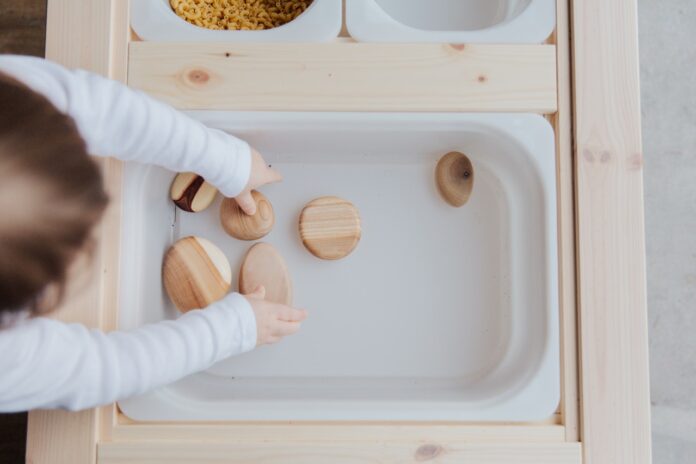Young children are like sponges, continuously taking in information from their environment. Because you are their parents, you have the amazing chance to foster their growth as learners and assist them in acquiring new abilities. This post will discuss effective ways parents can help their babies learn new skills faster. These techniques, which include providing your infant with a stimulating environment and participating in interactive play, will foster their growth and put them in a position to succeed in life.
Create an Atmosphere That is Caring
It is critical to your baby’s development that you provide a warm and loving atmosphere for learning. By providing a safe and stimulating environment, you may foster exploration and curiosity.
When infants are allowed to explore a secure environment freely, they can learn more effectively. You should ensure that your home is childproofed by removing any potential dangers that could impede your children’s growth. In addition, you can try to create a stimulating environment by providing age-appropriate toys, books, and other colorful objects that draw the children’s interest.
For the development of skills, encouraging active investigation is necessary. Allow your infant to walk about and investigate their environment as they wish. Their motor skills, spatial awareness, and cognitive capacities are improved as a result.
Develop Responsive Interactions
Interactions between parents and infants that are responsive lay the groundwork for children’s later development of language, emotional intelligence, and social skills. There are a lot of advantages to beginning an early conversation with your child. Have frequent verbal exchanges with your baby, explaining your everyday activities to them and responding to their cries and other sounds they make. This facilitates the development of their linguistic skills and promotes early communication among them.
Listening with intent is one of the most important components of responsive interactions. Pay attention to the cues, looks, and movements that your baby is giving you. The parent-child link can be strengthened, and the child’s trust can be earned through the parent’s rapid response to the child’s wants and needs.
Encourage the Exploration of Sensations
The cognitive and sensory development of a baby is greatly aided by the act of a baby exploring their world through their senses. You can introduce your kid to various sounds, smells, tastes, and textures. Offer them toys that range in shape, size, and material type. This stimulates kids to investigate the world through their senses, which is beneficial to developing their cognitive and physical skills.
Your baby’s sensory awareness and fine motor skills will improve significantly if you engage them in tactile play, such as finger painting or playing with sensory objects. Let children get their hands dirty and experiment with various materials; this is an important part of their learning.
Create a Set Schedule
The consistency and predictability that routines can provide are invaluable to the education and development of a young child. Create a routine for your day that allows flexibility but includes set times for eating, sleeping, playing, and learning activities. Babies benefit from having routines that are consistent because it helps them feel safe and it enables them to anticipate and participate well in a variety of activities.
A consistent feeding schedule for babies that are breastfed or formula-fed may help when it’s time to switch to solid foods. Because they are already acclimated to the feeding schedule as well as the bottle and the way the HiPP formula stage 2 tastes, the process of introducing new flavors and textures might be easier.
Participate in Games That Involve Interaction
For babies, learning new skills and becoming more curious about the world around them is best accomplished through play. The game of “Peek-a-boo” is not only a lot of fun for young children, but it also enables the development of object permanence in infants and boosts their cognitive capacities.
Your baby’s cognitive development can be aided by engaging them in activities that excite their senses, such as playing with water, sand, or toys made of soft materials. Allow children to play while exploring the various textures and stimulating their senses. Toys that foster skills development, including problem-solving, understanding of cause-and-effect linkages, and hand-eye coordination, are ideal for skill development. Choose toys for your infant that are appropriate for their age and give interesting features so that they may learn while playing.
Read Aloud
Reading to your child is one of the most effective strategies to encourage language development, improvement in cognitive skills, and the development of a love of reading and learning that will last a lifetime. You can look for picture books for kids that have brilliant visuals, fascinating textures, and simple stories. Books made of board or cloth are wonderful options for newborns and young children since these types of books are durable, and it is safe to put them in a child’s mouth or hold them in one’s hands.
When you read aloud, attempt to incorporate a variety of voices and expressions into what you’re saying in order to make the time you spend reading more interactive and engaging for the audience. This will not only keep your infant’s attention but will also help them develop linguistic skills, emotional intelligence, and the ability to understand tone.
Conclusion
One of your most significant duties as parents is to support your kids’ intellectual development as well as the growth of new skills. You may help your kids learn new skills more quickly by providing a nurturing environment, fostering responsive connection, promoting sensory exploration, establishing routines, playing interactively with them, and reading aloud to them.
Give your child the support and guidance they require, and take pleasure in watching them develop and broaden their understanding of the world around them.






















